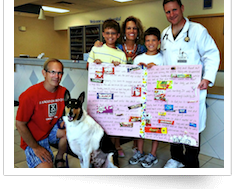Grief Support
Pet P.A.L.S. Group (Pet Preparation and Loss Support Group)
It can be extremely difficult to deal with the loss of your beloved pet. It is important to remember that everyone grieves in their own way. The resources on this page can provide a starting point for you to cope with your loss in the best way for you. If you would like additional information or counseling, please contact our office.
Information on Pet Loss and Grief Support Lines
University of Tennessee College of Veterinary Medicine
- Website
- Services: Help Line, Message Line
- Phone: 865-755-8839
- Hours: Monday-Friday, 8am-5pm
- Initial call is targeted for 20 minutes, but 4 one-hour individual grief counseling sessions are offered via phone.
The Association for Pet Loss and Bereavement
- Website
- Services: Pet Loss Resources and Chat Room
ASPCA Pet Loss Support
- Website
- Phone: 1-877-474-3310
National Suicide Prevention Lifeline
- Website (Chat Available)
- Phone: 1-800-273-TALK (8255)
Meaningful ways to Honor your Pet's Memory
- Have a proper burial for your pet.
- Place a stepping stone in your garden in your pet's memory.
- Put your pet's ashes in a potted plant, urn or under your favorite tree.
- Plant a tree or bush in your pet's honor.
- Have a portrait of your pet drawn from a favorite photo.
- Place your pet's identification tags on your key ring.
- Volunteer at a local humane organization.
- Make a donation in your pet's name to your favorite animal organization.
Facing the Decision
In order to make a sound decision, you need to be fully informed about your pet's condition and the medical options available. If any part of the diagnosis or the implications for your pet's future is unclear, ask for a further explanation. It is also okay to ask for a second opinion to assure yourself that the diagnosis is correct and that you have all the facts. But even with the facts in hand, it is often difficult to know just when the time has come. Take your time and make the decision that is best for you and your loved one.
Effects of Grief
Grief is a natural and normal reaction to loss and change. It affects you physically, emotionally, psychologically, and behaviorally as you continue to live your life.
Physical Effects of Grief
- Headaches
- Exhaustion
- Menstrual Irregularities
- Insomnia
- Hollowness
- Tremors or the Shakes
- Dizziness
- Muscular Aches
- Loss of Appetite
- Feeling of Tightness
- Breathlessness
- Anger
- Anxiety
- Sadness
- Yearning
- Self blame
- Guilt
- Sense of Helplessness
- Shock
- Numbness
- Sadness and Relief
- Sense of depersonalization in which nothing seems real, lack of concentration
- Sense of confusion
- Search for the meaning of life or death
- Dreams of the deceased
- Preoccupation with the image of the deceased
Personal Behavioral Effects
- Crying
- Avoiding reminders
- Over activity
- Withdrawal
- Carrying reminders
- Change of relationships
Ten Ways to Cope With the Loss of Your Pet
- Give yourself permission to grieve because you've experienced a tremendous loss. For many of us, out pets are our "children" - companions who provide unconditional love.
- Realize that you're not going crazy when you grieve deeply for a pet. It's normal when you've sustained a great loss to feel debilitated for awhile, so take all the time you need to heal.
- Know that guilt often accompanies grief, especially over pets. Because your pet couldn't tell you that he/she was sick, you may feel guilt about not taking him/her to the vet sooner or you may feel responsible if your pet was killed after escaping from the yard. Guilt - which suggests that you could have done something - can mask the fear of being powerless to keep your pet alive.
- Find a special way to say goodbye to your pet. Often, pet loss happens so quickly that you don't have time to say the things you wanted. But you can do so even after a pet has died. Write a letter to your pet. Have a family ritual celebrating his/her life and acknowledging death. Or look at a photo of your pet and tell him/her all you would have said if there had been time.
- Pick a meaningful way to memorialize your pet. Do a scrapbook, plant a tree, write a poem, or donate money in your pet's name to a charity for animals.
- If you decide to get another pet, do so only when you are ready. You will never be able to replace the pet you have lost; it takes time to invest emotionally in another.
- Find at least one other person you can talk to openly about your loss. Share your feelings without censorship. Realize that family members or other beloved ones may grieve differently or be in too much pain to support you.
- Be especially good to yourself because it takes a lot of energy to grieve. Get extra rest. Eat healthful diet. Drink lots of water. Avoid caffeine. Exercise moderately. Deeply relax through massage or meditation.
- Find creative expression for your feelings.
- Each day, do at least one thing that brings you joy. Fly a kite, take a walk, garden, watch the sunset, listen to music, see a funny movie. And allow yourself to laugh! Laughter releases the body's natural opiates and gives respite from pain.
How We Can Be Effective Helpers of Grieving Children
(Wass & Corr, 1984, Helping Children Cope With Death)
- We must be in the process of personal confrontation with death. From time to time we need to reflect upon and clarify our concepts, beliefs and attitudes about death. We must acknowledge our mortality and not be uncomfortable talking about it.
- We must perceive the child as a human being of worth and uniqueness.
- The child may look up to us for help, but we must be careful not to look down when giving it.
- We need to truly attempt to understand what the child is trying to tell us verbally, through body language and behavior.
- Have respect for the child's uniqueness.
- Try to see things and events from the child's perspective. We often answer questions children do not ask and fail to answer those they do.
- The child needs to feel psychologically safe and non-threatened. We should try to create an atmosphere of mutual respect and trust as well as open communication. This helps to encourage children to inquire and share their fears and concerns without fear of rejection.
- Honesty is key, and only strengthens the child's trust. This includes admission of ignorance if necessary.
The Hallmark Characteristics of Grief in Companion Animals
- Changes in eating, drinking, sleeping, or exercise habits
- Anxiety, restlessness, or a need to stay close to the owner
- Depression, heavy sighing, or disinterest in usual activities
- Destructive behaviors
- High-pitched distress vocalizations (especially in young animals)
- House soiling
- Searching the yard, house, and other familiar areas for the animal that has died
How to Help Your Grieving Pets
- Keep daily routines the same. Animals usually respond to environments that are predictable, familiar, and consistent.
- Do not inadvertently reinforce or reward negative behavior changes. For example, if a pet learns that anxious pacing results in repeated invitations to join its owner for a snuggle on the forbidden couch, it may be more likely to continue the anxious behavior. Instead of reinforcing unwanted behaviors, owners should provide their pets with positive reinforcement, such as attention and affection, when their pets are behaving in desirable ways.
- Watch for changes in the dominance hierarchy when there are two or more surviving pets. This is particularly true if the pet who died was the dominant animal because the remaining animals often compete for the dominant spot in the pecking order. Competition may involve growling, hissing, and even fighting, but the attacks usually do not result in injury. For the most part, owners should not punish their animals, but let the animals be on their own.
If Tears Could Build a Stairway
If tears could build a stairway,
and memories a lane,
I would walk right up to Heaven
and bring you back again.
No farewell words were spoken,
No time to say "Goodbye."
You were gone before I knew it,
and only God knows why.
My heart still aches with sadness,
and secret tears still flow.
What it means to love you-
No one can ever know.
But now I know you want me
To mourn for you no more;
To remember all the happy times,
life still has much in store.
Since you'll never be forgotten,
I pledge to you today-
A hollowed place within my heart
is where you'll always stay.




